Spring 2016 Speakers
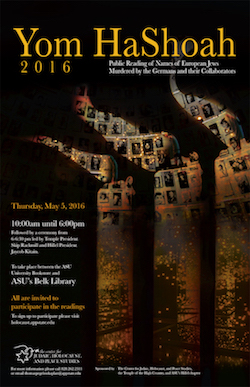 Yom HaShoah
Yom HaShoah
On May 5, Yom HaShoah (Holocaust Memorial Day), the Center for Judaic Holocaust, and Peace Studies along with the Temple of the High Country and ASU's Hillel chapter will organize a public reading of the names of European Jews murdered by the Germans and their allies during the Holocaust. This reading is scheduled to take place from 10:00 am until 6:00 pm in front of ASU's Belk Library and Information Commons. A ceremony that encompasses the lighting of candles and the saying of the mourner's Kaddish will conclude the readings, starting at 6:00 pm. ASU students, staff, faculty, members of the Temple and the Boone community at large are invited to sign up for one of the ten-minute reading slots ahead of time and participate. We hope that many members of the ASU and Boone communities will participate, linger and contemplate for as long as they like, and return to the 6:00 pm ceremony led by Temple President Skip Rackmill and Hillel President Jaycob Kitain.
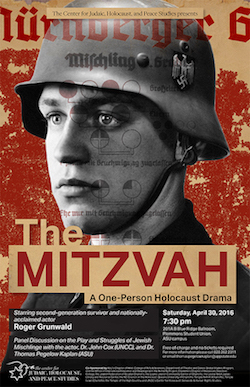 The Mitzvah
The Mitzvah
For this year's Yom HaShoah commemorations, ASU's Center for Judaic, Holocaust, and Peace Studies is working with a multitude of partners throughout North Carolina to organize a number of events to which the public, our members, and the ASU community are invited. The commemorations will begin with play by a second-generation Holocaust survivor and an educational program on Germans of Jewish ancestry in the Holocaust on Saturday, April 30. This program will start at 7:30 pm at Plemmons Student Union (Blue Ridge Ballroom, Room 201 AB). It is free of charge and open to the public. No tickets required.
The Saturday program will evolve around the Mitzvah Project, a one-person play performed by Roger Grunwald, an acclaimed actor and child of survivor who co-wrote the piece with Broadway veteran and director Annie McGreevey. The play tells the tragic story of Christoph Rosenberg, a German half-Jew who became a decorated officer in Hitler's army. The 30-minute play is followed by a panel discussion with the artist and two Holocaust historians. Roger Grunwald will reflect on the play and the Jewish Mischlinge who served in the Wehrmacht. Professor Thomas Pegelow Kaplan, the director of ASU's Center for Judaic, Holocaust & Peace Studies, will ponder the struggles of Mischlinge outside the military, focusing on their often long-lasting battles with state institutions such as the Reich Kinship Office--charged with determining racial descent in cases of doubt--and the Christian Churches. Professor John Cox (UNCC), finally, will talk about Jews and Jewish Mischlinge in the resistance against the Hitler state, demonstrating contributions made by Mischlinge in challenging a seemingly all-powerful Nazi party and dictatorship. The play and panel is followed by a question-and-answer period.
This program focuses on the struggles of Germans and other Europeans of partial Jewish ancestry whom the Nazi regime persecuted along with Jewish community members across the continent. In the early stages of its assault on German Jewry, the Nazi state deprived Jewish communities of the right to determine what it means to be Jewish and imposed racialized definitions of Jewishness on the Jewish population. Among others, Nazi bureaucrats introduced the "Jewish Mischling" or "half-breed" as a new legal category and created—in Nazi parlance—a "third race" that was comprised of descendants of one or two "full-Jewish" grandparents. The Nazi state defined more than 100,000 women, men, and children as Mischlinge. A minority of them joined the Jewish communities; most of them, however, originally belonged to one of the Christian Churches. They had Jewish ancestors and, in many cases, living Jewish relatives, including a Jewish parent. Initially, many male Mischlinge were drafted and fought in Hitler's military. Some willingly served in the hopes of being able to protect their Jewish mother or father. In the course of the 1930s and early 1940s, almost all Mischlinge gradually lost their rights and were subjected to ever increasing discrimination. Many were deported to work camps and some to death camps like Auschwitz.
Roger Grunwald has been a professional performing artist for almost four decades. In 2013, he was honored with a grant from the New York Foundation for the Arts (NYFA) for the development of The Mitzvah Project. He has performed the play to high acclaim in synagogues and on university campuses throughout the United States and will be heading to the U.K. in 2016. He is a graduate of the University of California, Berkeley, and the London Academy of Music and Dramatic Art. Grunwald has appeared in over 70 stage productions in the United States and Europe. From the early 1980s through the mid 2000s, he was one of a handful of community organizers that founded the non-profit All Stars Project, which has pioneered an innovative approach to youth development using theatrical performance. Grunwald is also on the Speakers Bureau of the Jewish Federation. Thomas Pegelow Kaplan is the Leon Levine Distinguished Professor and Director of the Center for Judaic, Holocaust, and Peace Studies at Appalachian State University in North Carolina. He has studied modern European history and American Studies in Tübingen, Eugene, Berlin, and Chapel Hill. Before coming to ASU, he taught Holocaust Studies at Grinnell College, Davidson College, and De La Salle University in Manila, Philippines. His research focuses on histories of violence, language, and culture of Nazi Germany and Nazi-occupied Europe and the 1960s global youth revolts. He is the author of numerous book chapter and articles. His first monograph entitled The Language of Nazi Genocide: Linguistic Violence and the Struggle of Germans of Jewish Ancestry (Cambridge University Press, 2011) explores how words preceded, accompanied, and made mass murder possible. John Cox is a historian of genocide and modern world history and directs the Center for Holocaust, Genocide & Human Rights Studies at UNC Charlotte, where he serves as associate professor. He earned his PhD at UNC-Chapel Hill in 2005. Cox is the author of Circles of Resistance: Jewish, Leftist, and Youth Dissidence in Nazi Germany (Peter Lang Publishing, 2009). His second book To Kill a People: Genocide in the Twentieth Century will be published by Oxford University Press in February 2016. Cox has written and lectured extensively on the Holocaust, other genocides, and anti-Nazi resistance.
On May 5, Yom HaShoah (Holocaust Memorial Day), the Center, Temple of the High Country and ASU's Hillel chapter also hold a public reading of the names of European Jews murdered by the Germans during the Holocaust in front of Belk Library. This reading is scheduled to start at 10:00 am and will last until 6:00 pm, when it concludes with a ceremony. For more information and instructions on how to sign up to be part of the reading, please see the Center webpage on this event.
For questions about the play and panel, please call 828.262.2311 or email thomaspegelowkaplan@appstate.edu.
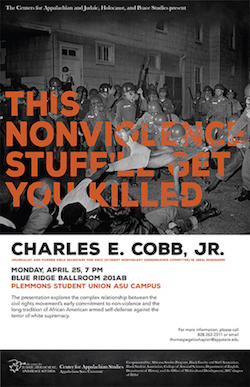
This Nonviolence Stuff'll Get You Killed
The presentation explores the complex relationship between the civil right movement's ealy commitment to non-violence and the long tradition of African American armed self-defense against the terror of white supremacy.
at the Plemmons Student Union's Blue Ridge Ballroom, Room 201 AB. The lecture is free and open to the public.
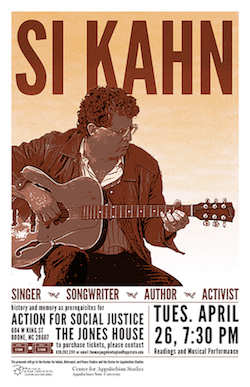 Si Kahn
Si Kahn
Rosanne Cash, singer, songwriter, author: "If the 'arc of the moral universe bends toward justice', as Martin Luther King said, then Si Kahn has devoted his life to riding that arc. His powerful impulse to service, combined with deep compassion, is a force of nature. I put Si in the same category as Woody Guthrie, as Pete Seeger, and in a strange way, with my Dad, who shared his righteous sense of humanity, and his love of the 'meek', who he truly believed would 'inherit the earth.'"
Rabbi David Saperstein, Director, Religious Action Center of Reform Judaism: "This beautifully written book (Creative Community Organizing) captures the connections of Jewish values and American democratic ideals as memorably, movingly and vividly as any I have read. An inspiring, remarkably insightful and urgently needed treasure for social justice activists everywhere."
Please join us at the Jones House in Boone on Tuesday, April 26 at 7:30 p.m. for a fundraising event featuring social justice organizer and musician Si Kahn. Benefiting the Center for Judaic, Holocaust, and Peace Studies and the Center for Appalachian Studies at Appalachian State University, this intimate get-together limited to 40 people will explore the role of history and memory in the pursuit of social justice.
For his special return visit to the High Country, Si will read and perform songs from his two most recent musicals, Hope and Precious Memories. Refreshments and hors d'oeuvres will be served.
Si's appearance at the Jones House is part of a larger program on African-American and Jewish organizers in the freedom struggle of the 1960s. On Tuesday morning, April 26, Si will be on a 10:30 am panel with Charles E. Cobb, Jr., a SNCC field secretary in mid-1960s Mississippi, and current ASU student activists. The panel will take place at the Greenbriar Theater, Plemmons Student Union (PSU), Room 200.
The overall program will start at 7:00 pm on Monday, April 25, at PSU's Blue Ridge Ballroom, Room 201 AB, with a lecture by Charlie Cobb based on his latest book, This Nonviolent Stuff'll Get You Killed: How Guns Made the Civil Rights Movement Possible. Cobb's presentation explores the complex relationship between the civil rights movement's early commitment to non-violence and the long tradition of African American armed self-defense against the terror of white supremacy.
At the Jones House event Tuesday evening, Dr. William Schumann, director of the Center for Appalachian Studies and Dr. Thomas Pegelow Kaplan, director of the Center for Judaic, Holocaust, and Peace Studies, will introduce guests to the work of their respective centers in order to invite conversation about the role of the university in supporting inclusive, sustainable community development.
To join us for this special event, a suggested minimum donation of $50 per ticket should be mailed to either center prior to the event. Contributors of $100 or more will receive an autographed copy of Si Kahn's latest book Creative Community Organizers: A Guide for Rabble-Rousers, Activists and Quiet Lovers of Justice.
A receipt for the value of your charitable donation will be mailed back with your tickets. Please mail your check for $50 or more to either of the following addresses:
Center for Appalachian Studies Center for Judaic, Holocaust, and Peace Studies
ASU Box 32018 ASU Box 32146
Boone, NC 28607 Boone, NC 28607
About Si Kahn
Si Kahn will enliven the discussion by sharing a unique perspective that transcends social activism, scholarship, music, and the arts. Born in 1944, Si Kahn has worked for over 50 years as a civil rights, labor and community organizer and musician. He began his organizing career in 1965 in Arkansas with the Student Nonviolent Coordinating Committee, more popularly known as SNCC, the student wing of the Southern Civil Rights Movement.
Si worked with the United Mine Workers of America (UMWA) on the Brookside Strike in Harlan County, Kentucky and with the Amalgamated Clothing and Textile Workers Union (ACTWU) on the J.P. Stevens campaign. These historic labor struggles are documented in the movies Harlan County U.S.A. and Norma Rae. His latest social justice organizing project is Musicians United To Protect Bristol Bay, an international network of over 500 musicians working to help stop the proposed Pebble Mine in Alaska's magnificent Bristol Bay.
A long time activist in the Jewish community, Si carries on the work of his father Rabbi Benjamin M. Kahn, who served as the international head of B'nai B'rith. Si himself was the founding national chair of the Jewish Fund for Justice, the predecessor organization to Bend the Arc: A Jewish Partnership for Justice. Bend the Arc is building the power and passion of the progressive Jewish movement in America by bringing together Jews from across the country to advocate and organize for a more just and equal society, the only national Jewish organization that is focused solely on promoting these values here in the U.S.
Si has worked for over 40 years as a composer, lyricist and book writer for musical theater, including productions and readings at the Berkeley, Milwaukee and Tennessee Repertory Theaters. The World Premiere of his latest musical Hope will open at Main Stage West in Sebastopol, California on June 18, 2016. A brief description of Hope reads:
What do the following have in common: Soldiers in the Czar's army, shoe factory workers, gas station operators, rabbis, civil rights leaders, pick and shovel laborers on the Canadian Pacific Railroad, Jewish faith healers, illegal immigrants, hod carriers, bootleggers, a soldier in the trenches of World War I, Talmudic scholars and a driver for Al Capone?
They're all among the older generations of Si Kahn's Polish, Russian, Lithuanian, Austrian, American Jewish family, stretching back to the 19th century and his great-great-grandmother.
With special appearances by (in more or less alphabetical order): the Angel of Death, the Black Plague, gold cigar cutters, corned beef, Cossacks, the Czar, the "Goldene Medina," (the "Golden Land"), the Italian mob, the Jewish mob, the Kaddish, Emma Lazarus, Miami Beach, miracles, pastrami, pogroms, Pete Seeger, shrimp-wrapped bacon and the Statue of Liberty.
Si's play with music Precious Memories was recently published in full in the "Appalachian Music Special Edition" of ASU's Appalachian Journal. Precious Memories is about the life and times of Sarah Ogan Gunning, a Bell County, Kentucky traditional singer and union songwriter. Si wrote the script but not the songs, which are by Sarah ("I Hate the Capitalist System"); her brother Jim Garland ("I Don't Want Your Millions Mister," the real point of which is that we do); and her half-sister Aunt Molly Jackson ("I Am A Union Woman"), plus two traditional ballads and excerpts from three gospel songs.
A prolific recording artist, Si's 16th CD Courage was named the #1 CD for 2010 by the Folk Alliance. Si has toured and recorded with Pete Seeger, and has performed at concerts and festivals in a dozen countries.
Si received an A.B. degree from Harvard University in 1965 and a Ph.D. in American Studies in 1995 with a specialization in Cultural Studies from The Graduate College for Interdisciplinary Arts and Sciences of The Union Institute.
He is the author of three widely used organizing handbooks: How People Get Power; Organizing: A Guide for Grassroots Leaders; and Creative Community Organizing: A Guide for Rabble-Rousers, Activists and Quiet Lovers of Justice. He is the co-author of The Fox in the Henhouse: How Privatization Threatens Democracy written with public philosopher, feminist and educator Elizabeth Minnich, his very long time partner and spouse.
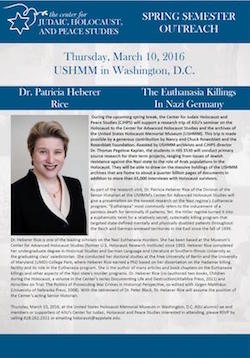 Off-Campus Center Program: USHMM Historian Dr. Patricia Heberer Rice to Speak on Euthanasia Killings to ASU Students in Washington, D.C.
Off-Campus Center Program: USHMM Historian Dr. Patricia Heberer Rice to Speak on Euthanasia Killings to ASU Students in Washington, D.C.
During the upcoming spring break, the Center for Judaic Holocaust and Peace Studies (CJHPS) will support a research trip of ASU's seminar on the Holocaust to the Center for Advanced Holocaust Studies and the archives of the United States Holocaust Memorial Museum (USHMM). This trip is made possible by a generous contribution by Nancy and Chuck Rosenblatt and the Rosenblatt Foundation. Assisted by USHMM archivists and CJHPS director Dr. Thomas Pegelow Kaplan, the students in HIS 3530 will conduct primary source research for their term projects, ranging from issues of Jewish resistance against the Nazi state to the role of Arab populations in the Holocaust. They will be able to draw on the massive holdings of the USHMM archives that are home to about a quarter billion pages of documents in addition to more than 65,000 interviews with Holocaust survivors.
As part of the research visit, Dr. Patricia Heberer Rice of the Division of the Senior Historian at the USHMM's Center for Advanced Holocaust Studies will give a presentation on the newest research on the Nazi regime's Euthanasia program. "Euthanasia" most commonly refers to the inducement of a painless death for terminally ill patients. Yet, the Hitler regime turned it into a euphemistic term for a relatively secret, systematic killing program that targeted state-defined mentally and physically disabled patients throughout the Reich and German-annexed territories in the East since the fall of 1939.
Dr. Heberer Rice is one of the leading scholars on the Nazi Euthanasia murders. She has been based at the Museum's Center for Advanced Holocaust Studies (former U.S. Holocaust Research Institute) since 1993. Heberer Rice completed her undergraduate degree in Historical Studies and German Language and Literature at Southern Illinois University as the graduating class' valedictorian. She conducted her doctoral studies at the Free University of Berlin and the University of Maryland (UMD)-College Park, where Heberer Rice earned a PhD based on her dissertation on the Hadamar killing facility and its role in the Euthanasia program. She is the author of many articles and book chapters on the Euthanasia killings and other aspects of the Nazi state's murder programs. Dr. Heberer Rice (co-)authored two books, Children during the Holocaust, a volume in the Center's series Documenting Life and Destruction(AltaMira Press, 2011) and Atrocities on Trial: The Politics of Prosecuting War Crimes in Historical Perspective, co-edited with Jürgen Matthäus (University of Nebraska Press, 2008). With the retirement of Dr. Peter Black, Dr. Heberer Rice will assume the position of the Center's acting Senior Historian.
Thursday, March 10, 2016, at the United States Holocaust Memorial Museum in Washington, D.C. ASU alumni/-ae and members or supporters of ASU's Center for Judaic, Holocaust and Peace Studies interested in attending, please RSVP by calling 828.262.2311 or emailing holocaust@appstate.edu.